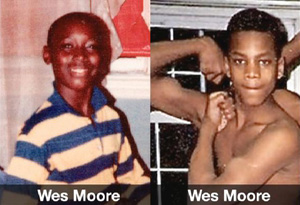Hey class,
Now that you've received your (free) copy of Wes Moore's book, The Other Wes Moore, you should start peeling away at the pages. Read some of it everyday. Enjoy it with a coffee or at night before bed.
It is a light read. It's fast paced and interesting.
I thought that this book would be suitable for this class for many reasons. The simplest connection I can make is that Wes Moore discovers the other Wes Moore in newspaper. But that's too easy...
This book is interesting because is exposes human nature. As we discuss our various viewpoints in class, it's important to understand the background of peoples' choices and opinions. When we discuss politics, and read opposing viewpoints, we must trace the root of someone's (or an institution's) analysis.
Ok, we know what they believe, but how did they reach that conclusion? What makes people think this way? Why don't I agree with them? (or why do I agree with them?)
As we debate topics and dive into the American (and world) political scene, it's important to know where people are coming from. By tracing knowledge and opinion to the root, we can then start to figure out how to teach, how to influence, and how to change.
If someone cannot relate with you, how can they convince you of anything? Sometimes, as the observer, you need to be the one trying to connect. It's a two way street.
We are much more connected than it initially seems.
Yes, we may often have more in common with our rivals and "enemies" (intellectual) than we believe.
And that's where this book comes into play. The author, the "good' Wes Moore confronts someone (of the same name), who grew up in a similar neighborhood, with similar circumstances. Yet, the two men take two separate paths. One becomes a successful man, the other is still serving his life sentence in prison.
 |
| Can you tell which one is the "good" one? |
The question is: how did they go down diverging paths? Was it coincidence?
It's much more than that. It comes down the details. The little, minute choices we make a daily basis. It comes down to, not the mistakes that we make, but how we choose to bounce back from them.
I also thought that this book is a great supplement to our Justice in America class that we conducted two weeks ago. We discussed the idea of reform. Are some people inherently "bad"? What are we to do with them?
This book may open your eyes to the system, and put a face and history to a man that many people (including a jury) considered "bad" or "evil". You may agree or not. But was this person not a simple human being when he was growing up?
You decide. But always consider the history, the whole history, before you put you foot down.
I hope that you enjoy this book. Think about the choices that you've made, and how you've bounced back from conflicts in your life. We all have them. We're all human. But we all take different paths... on our way to a similar goal.
Read the book. Enjoy the book. Share the book.

0 comments:
Post a Comment